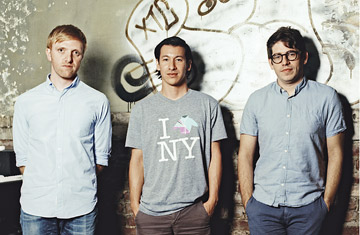
Kickstarter co-founders Charles Adler, Perry Chen and Yancey Strickler.
"As many of you know, the entertainment industry is filled with incredible scripts written by incredible talent that have not or will never get made. Or worse, they'll get changed into something that is nowhere close to what the original creator envisioned."
The speaker is a suave, bearded gent in a striped bow tie and burgundy cable-knit sweater. He's seeking financing for Anomalisa, a film written by Charlie Kaufman, the author of the screenplays for Being John Malkovich, Adaptation and Eternal Sunshine of the Spotless Mind. He gives a sales talk that's convincing--inspiring, even.
He also happens to be an animated puppet. That's less peculiar than it sounds. Anomalisa is a project on Kickstarter, the highest-profile website engaged in the crowdfunding of new ideas, including everything from board games to offbeat tech gadgets to movies. An engaging sales video, like the one hosted by the puppet pitchman, is critical to a project's success.
This one did the job: the stop-motion animated featurette breezed by its $200,000 funding goal, raising more than $400,000 from 5,770 backers in a month. These patrons won't receive an ownership stake. All they'll get in return is a warm, fuzzy feeling and a thank-you gift scaled to the size of their pledge, starting with a thank-you on the movie's Facebook page and a downloadable video clip offered to anyone who donated at least $5.
The extraordinary thing about Anomalisa's crowdfunding story is that it isn't extraordinary. In 2010 the creators of TikTok and LunaTik--watchbands that let you strap an iPod Nano to your wrist--made headlines when they used Kickstarter to raise $942,578. This year's biggest winners are larger by an order of magnitude: Pebble, a smart watch that uses electronic-ink technology, raised $10.3 million, and Ouya, a pint-size gaming console that runs Google's Android software, received $8.6 million.
And it's not just Kickstarter. Over at Indiegogo, the other big-time crowdfunding site, online cartoonist Matthew Inman set out to raise $850,000 to help turn the Long Island lab of electrical pioneer Nikola Tesla (1856--1943) into a Tesla museum. Halfway into his monthlong campaign, he had already raised $1,251,144 from more than 30,000 individuals, some of whom put up as little as $3.
"This notion that people will pay prospectively for something they want to exist is fundamentally new," says publisher and technologist Tim O'Reilly. But it's a logical development on the Web, the most efficient tool ever devised for pooling the interests and resources of large numbers of disparate people.
Wikipedia proved that the crowd can collect the world's knowledge with a level of ambition--if not always accuracy--that rendered the dead-tree Encyclopaedia Britannica obsolete. Twitter has repeatedly shown that the crowd can often report breaking stories faster than traditional news-gathering operations do. Millions of Facebook members clicking Like buttons efficiently puts articles, videos and other items in front of other people who might enjoy them.
